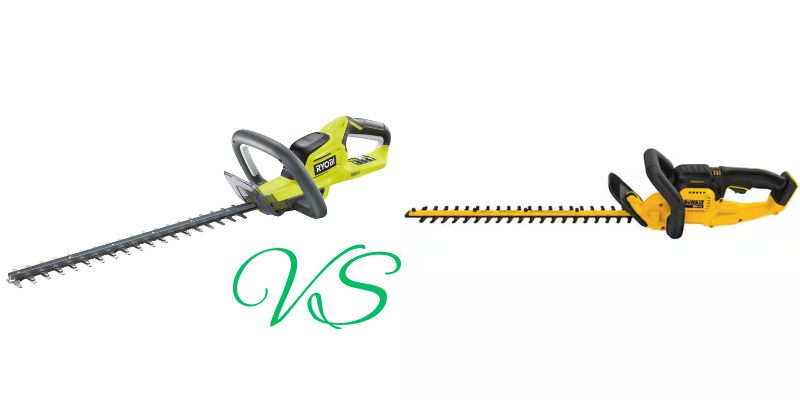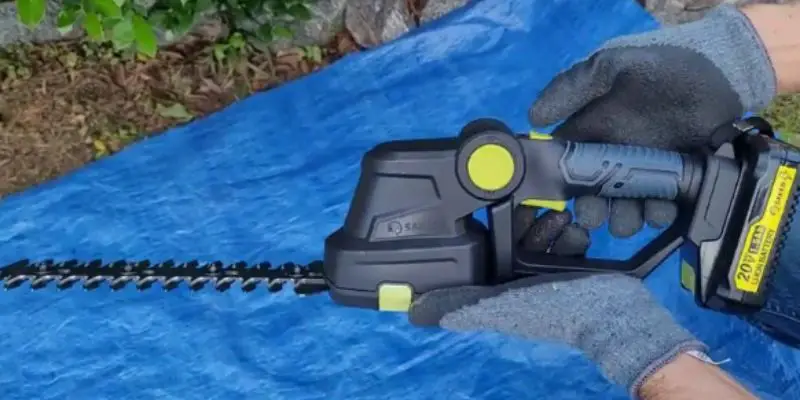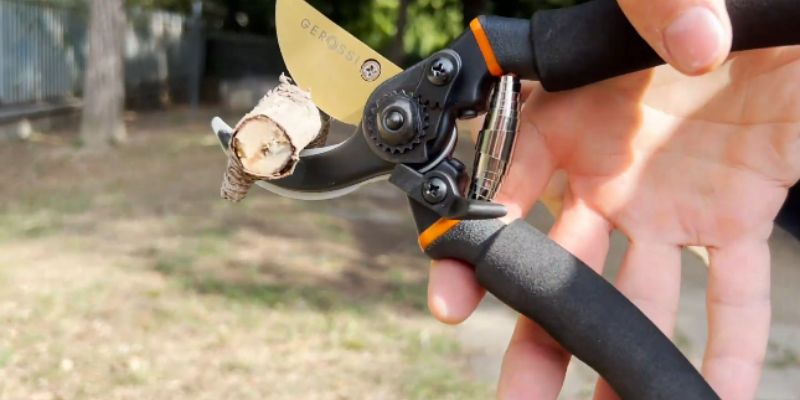Over two decades spent landscaping has exposed me to just about every tool under the sun. Among those to stand the test of time are Ryobi and DeWalt. Their trimmers, pruners, and shears have proven themselves time and again for my crew and me. In this guide, I will do a detailed Ryobi vs DeWalt comparison.
Reliable performance, comfortable ergonomics, and rugged craftsmanship have made these brands workhorses in my trailer. When it comes to keeping commercial and residential grounds impeccable, they deliver day after day.
Of course, no tool is perfect for every job. So let me offer a comparison based on real-world experience. Power sources, durability, and cutting prowess – what excels, and where is there room for improvement? I’ll break down specs versus what stands up in practice.
I aim to help you find solutions that work. So whether your needs skew home or professional, hopefully, the insights of a lifelong landscaper prove helpful. Some tools sound ideal on paper. But only years in the field reveal what lasts through all weather and conditions.
Having logged thousands of hours in the field putting these tools through their paces, I can offer insights that go far beyond marketing fluff. This is the type of real-world expertise backed by sweat equity that DIY homeowners and working crews alike can use to avoid buyer’s remorse.
By the time you finish this head-to-head breakdown, you’ll have the tried-and-true knowledge to decide whether Ryobi or DeWalt deserves a spot in your equipment shed for all your trimming, pruning, and shearing needs. Let’s kick things off by looking at the all-important power and performance category.
Best Electric Black & Decker Hedge Trimmer – Top 3 Corded Picks
Power and Performance: DeWalt’s Pro Edge
Whether I’m tackling thick brambles, overrun flower beds, or waist-high weed patches, I need tools that can reliably power through tough vegetation without bogging down or leaving behind a mess. That consistent, high-torque performance is where DeWalt’s lineup of gas trimmers like the DCST972 straight-shaft model has won me over compared to Ryobi’s offerings.
Built around robust 25cc 2-cycle engines, DeWalt’s gas trimmers deliver the type of stump-pulling power and fast-cutting speeds that busy pros demand. I’ve used these workhorses to knock down extremely overgrown lots and shred through dense shrub branches that would hopelessly overwhelm lower-end trimmers.
Ryobi does make some capable gas trimmers for both curved and straight shaft applications. But based on my field testing, their engines can’t quite match the raw torque output and performance under load as DeWalt’s pro-duty lineup. Thicker vegetation causes more noticeable rpm drops on Ryobi models, which can leave you fighting excessive vibration and diminishing cutting results.
The performance gap narrows in the battery-powered tool category where Ryobi and DeWalt are both bringing their latest brushless motor and lithium-ion advancements to bear. DeWalt’s 20V Max, 60V Max, and Flexvolt string trimmer and shrub trimmer kits deliver plenty of cutting muscle to be viable gas replacements for lighter-duty residential work.
But for uncompromising all-day runtime and zero performance fade, DeWalt continues pulling ahead thanks to the sheer voltage capabilities of their batteries and more advanced brushless motor designs. My DeWalt 60V Max trimmers can easily power through a full 8-hour day of demanding commercial trimming before needing a battery swap.
Ryobi’s cordless trimmer game is no slouch, especially with models like the 40V HP Brushless line that rivals DeWalt’s 20V Max offerings in raw cutting power and efficiency. But once you transition to all-day pruning shear and hedge trimmer duties, you’ll start experiencing more notable drops in cutting speed as Ryobi’s battery packs begin depleting their charge.
That performance delta is even more pronounced on heavy growth as DeWalt’s dual-action shear blades can slice cleanly through thick branches in fewer passes versus Ryobi’s single-action approach. For large commercial yards, estates, and high-volume workloads, DeWalt’s pro-focused cordless engineering and battery tech give it the overall edge in the power and raw cutting performance categories.
Durability and Build Quality: DeWalt’s Uncompromising Standards
Reliable longevity is crucial for any piece of outdoor power equipment a landscaping crew relies on day in and day out. The last thing you want is tools that develop premature component failures or durability issues that pause your progress and productivity. Given my high-volume workload, shoddy build quality is simply not an option.
That’s why DeWalt’s longstanding reputation for prioritizing tank-like construction and premium materials speaks volumes in my book. From their gas trimmers to pruners and cordless shrub shavers, DeWalt tools exude a purpose-built heft and ruggedness tailored for professionals facing harsh job site conditions.
The robustly engineered drivetrain components and thick metal drive cables are the perfect example of DeWalt’s unwillingness to cut corners. Even after years of heavy use, I’ve never experienced any issues with premature cable shielding or driveshaft failures on my crew’s DeWalt trimmers. That peace of mind is invaluable versus the constant repairs you often face with less solidly built competitors.
DeWalt also utilizes heavy-duty aluminum alloy gear cases, cast magnesium components, and reinforced stainless steel blades that can shrug off serious abuse and accidental impacts. I’ve witnessed firsthand these tools surviving drops off tailgates to concrete with only minor cosmetic scratches remaining.
So while price tags tend to be higher upfront for professional-grade DeWalt tools, the investment buys you products that are quite literally built like tanks. This robustness minimizes ongoing maintenance costs and downtime compared to cheaper trimmers and pruners built with lower-quality components that are destined to break.
To be fair, Ryobi’s build quality and materials have improved markedly in recent years as the brand pushes further into the pro landscaping space. Their top-tier offerings avoid cheap plastics and incorporate aluminum and steel components that deliver respectable longevity.
My Ryobi gas trimmer and pruner shears have proven plenty durable over the past 5+ seasons of steady use. But they still succumb to hairline casing cracks and pesky component gremlins like stripped gears or jammed drivetrain mechanisms more frequently than I’ve experienced with DeWalt’s lineup.
So while Ryobi is slowly closing the durability gap, DeWalt remains the brand you can trust implicitly for commercial-duty applications and unyielding workloads year after year. You’re getting genuine pieces of heavy machinery with DeWalt rather than tools purposefully engineered to a lower cost threshold.
Cutting Performance: Ryobi for the Casual Crew, DeWalt for Demanding Worksites
Cutting performance is perhaps the most visible and immediate way to judge trimmer and pruner tools side-by-side. If one brand consistently leaves behind stragglers, excess debris, or just can’t keep up with thick overgrowth, its limitations become glaringly obvious on a day-to-day basis.
For lightweight trimming tasks around the home, Ryobi delivers perfectly adequate cutting prowess thanks to its solid engine power outputs and capable line trimmer heads. My 40V brushless trimmer is a personal go-to for maintaining tidy lines and edges on my lawn. Fast, efficient cutting combined with smooth feed systems keeps work progressing steadily.
But introduce Ryobi to densely overgrown lots with that dreaded layer of thick weeds and gnarly bushes, and some weaknesses emerge compared to DeWalt’s professional-grade lineup. General cutting speeds and efficiency suffer, with Ryobi models often requiring more frequent line reloads and additional trimmer passes to complete the job.
DeWalt tackles these challenging environments and vegetation types with aplomb, relying on brute force engine torque to simply power through problematic growth. Best-in-class trimmer head and line arming designs also prevent the annoying snaps and jams that can often plague other brands, maintaining peak cutting efficacy even under duress.
The cutting performance delta between Ryobi and DeWalt emerges on larger pruning shear and hedge trimmer applications. DeWalt’s robust dual-action blade configurations chew through thick branches far more efficiently than Ryobi’s traditional single-action approach.
Ryobi’s more budget-oriented blade components also just can’t match DeWalt’s cut quality and precision when manicuring hedges, shrubs, and decorative bushes. You tend to get more rough edges, missed passes, and less professional-looking results overall compared to the clean shearing and shaping prowess of DeWalt’s top-tier models.
This difference became glaringly obvious to me on a large estate property I maintain. After using my Ryobi 40V pruning shears to groom the ornamental bushes lining the front entryway, I had to go back and spend extra time evening out visible cutting lines and stray branches my Ryobi couldn’t quite slice cleanly. Frustrating work considering how much time it added to the job.
But when I switched over to my DeWalt 20V Max pruning shears for the rest of the property, the superior cutting experience was night and day. Thick brambles were sliced through quickly with fewer passes required. Decorative shrubs were sculpted into perfect spheres and squares. Zero stray cuttings or dangling debris left behind.
DeWalt’s dual-shearing blades coupled with the brute force of its high-torque, high RPM brushless motors simply overwhelmed and overpowered anything my Ryobi could muster on that challenging landscape. The professional-grade cutting results were exactly what I’ve come to expect from the brand.
Best Electric Bush Trimmers – Top 5 Reviews and Buying Guide
Ryobi vs DeWalt Maneuverability and Ease of Use
Of course, having powerful and precise cutting capabilities only gets you so far if the trimmer or pruner is a wrestling match to actually maneuver and use effectively. Thankfully, both Ryobi and DeWalt have invested substantially in ergonomics to enhance user experiences.
Ryobi in particular has leaned heavily into design priorities that maximize comfort and ease-of-use for homeowners and entry-level crews. Their trimmer models incorporate features like adjustable auxiliary handles, full-grip over-molding, and lightweight architectures that minimize user fatigue.
I’ve found Ryobi’s curved shaft trimmers exceptionally easy to maneuver and operate, able to precisely guide the trimmer head into even extremely tight spaces with minimal strain or awkward contortions. Little ergonomic touches like translucent surface windows to monitor line life make a difference in convenience.
DeWalt also deserves kudos for tackling ergonomics from the professional’s perspective. Features like rotating rear handles, robust D-grip surfaces, and adjustable-length assist handles play a major role in enhancing leverage and promoting proper body mechanics. This allows me to maintain maximum comfort and control even during extended trimming and pruning sessions.
Where DeWalt truly distinguishes itself is balancing these user-friendly experiences with raw cutting power in the same handheld footprint. My DeWalt 20V Max string trimmer weighs a few pounds more than Ryobi’s equivalent models. But that extra mass is intelligently distributed to maximize cutting output while preserving an extremely well-balanced feel for minimal wrist strain. Vibration dampening also feels better controlled to reduce fatigue.
On the pruning shear side, DeWalt’s articulating pivoting head designs provide an unmatched ability to attack growth at virtually any angle compared to traditional straight-shaft models. I cannot overstate how much of a difference-maker this level of flexibility and precision has been in grooming decorative hedges and bushes cleanly.
So while Ryobi delivers superb maneuverability for lighter homeowner tasks, DeWalt manages to bridge the gap between optimized ergonomics and uncompromising commercial-grade cutting prowess. It’s that perfect middle ground that makes DeWalt’s tools incredibly versatile across a huge range of demands and user experience levels.
Battery Tech and Runtime: DeWalt’s Clear Advantage
In today’s modern battery-powered outdoor power equipment landscape, reliable high-capacity battery technology is arguably the most critical factor separating professional-grade products from the rest of the pack. Unfortunately, it’s also an area where DeWalt demonstrates a clear-cut advantage over Ryobi when it comes to all-day runtimes and overall battery performance.
To be fair, Ryobi has made major advancements in recent years with its lithium-ion battery development. The 40V HP Brushless battery packs deliver greatly improved cycle life and holding capacity compared to the brand’s previous-generation tech. Capable of over an hour’s runtime for most basic trimming tasks, these batteries are well-suited for the casual homeowner.
But as I’ve experienced firsthand, that runtime begins dropping off rapidly once you start introducing tougher overgrowth, heavy brush, and high ambient temperatures into the equation. The high current draw of demanding workloads like thick pruning sessions can see Ryobi’s batteries depleting in under an hour, requiring constant swaps that kill productivity.
DeWalt, on the other hand, has optimized its high-capacity battery packs and brushless motor combinations from the ground up to deliver true all-day runtimes under even brutal conditions. My crew routinely gets 5-7 hours of grueling trimming, pruning, and shearing per charge on our DeWalt 60V Max and FlexVolt tool platforms. That’s more than enough to handle even our largest residential clients without needing battery swaps.
The advanced lithium-ion chemistry and intelligent power management in DeWalt’s newer batteries are just on another level, minimizing charge memories and pack degradation over time. After three years of heavy use, my oldest DeWalt batteries are still holding up amazingly well with minimal capacity loss.
Ryobi’s batteries exhibit more noticeable regression after a couple of years in high-heat commercial environments. You’ll start seeing reduced runtimes, longer charging times, and shorter overall lifespan – an expensive ding against the long-term value proposition.
Speaking of charging, DeWalt also delivers in the rapid charging department with robust multi-port fast chargers that can top up a depleted battery to 100% in under an hour. Ryobi’s standard single-battery chargers require tedious battery swapping and can take up to 90 minutes for a full charge. A huge time-suck that frequently leaves me waiting on batteries rather than being productive.
Between the superior battery technology, interchangeable cross-platform designs, and rapid charging speeds, DeWalt has a clear edge that maximizes productive uptime for crews working sunup to sundown.
Best Rated Battery Powered Hedge Trimmer – Top 8 Reviews
Ryobi vs DeWalt Versatility and Compatibility
Having tool systems that work seamlessly together with shared batteries and chargers can be a major convenience, especially for larger landscaping companies trying to streamline operations. Fortunately, both Ryobi and DeWalt have built impressively versatile ecosystems.
For Ryobi, their 18V One+ and 40V HP Brushless product lines cover a huge array of trimmers, pruners, edgers, leaf blowers, hedge shears, and even lawn equipment like mowers and tillers. All using the same interchangeable batteries. It creates a nicely centralized system for buying new tools over time without compatibility headaches.
Their new HP Brushless batteries also feature USB charge-out ports to power mobile devices. And being able to charge my 18V tools from the 40V charger is a clever convenience. Details like these showcase Ryobi’s user-friendly philosophy.
But if we’re talking about the sheer breadth of the tool ecosystem, battery compatibility, and cross-platform versatility, DeWalt is the undisputed champion. Combining the 20V Max, 60V FlexVolt, and 60V Max lines into a centralized battery matrix has been an absolute game-changer in terms of convenience and runtime options.
With an affordable voltmeter adapter, I can use DeWalt’s robust 60V battery packs with ANY of their 20V Max tools to get insane runtime extensions. Or run the 60V Max pruners and trimmers in high-power mode. The versatility is impressively well-executed.
DeWalt’s lineup extends to just about any piece of power equipment a landscaping crew could need – mowers, tillers, snow blowers, chainsaws, power tools, you name it. All integrate seamlessly into the centralized DeWalt 20V/60V/120V Max battery system with universal rapid charging. It’s the ultimate professional-grade ecosystem.
Add in the modular storage and ToughSystem organizational components DeWalt makes for these tool lines, and it becomes almost impossible for competitors to match the convenience and versatility of modern landscaping fleets.
Long-Term Value and Warranty Support
At the end of the day, whether you’re a professional crew investing in landscape tools for commercial use or a committed DIY weekend warrior, receiving a solid value on your equipment purchases is crucial. Upfront costs only tell part of the story – long-term maintenance, durability, and manufacturer warranty support play huge roles in determining ownership value over years of use.
This is an area where DeWalt’s professional-grade focus and commitment to their core trades shine compared to Ryobi. You’re simply getting more premium components, more robust engineering, and stronger warranty policies baked into those higher pricing tags.
Let’s start with those all-important warranties. DeWalt offers one of the most comprehensive protection plans in the industry for outdoor power tools:
- 3-year limited warranty on lithium-ion tools and batteries
- 2-year limited warranty on gas tools
- 1-year free service contract
That’s complete peace of mind against defects and premature failures for the first couple of years of ownership. Any issues and DeWalt has you covered with depot service and repair channels.
Ryobi’s warranties are more consumer-focused at 3 years for tools and batteries, but only 2 years for gas models. While still decent coverage windows, you lose that extra year of protection DeWalt provides on their professional lineup.
More importantly, DeWalt’s longstanding reputation for premium materials and overengineered components leads to longer overall product life before any warranties even come into play.
The meticulous engineering and design behind their string trimmers and pruning shears translate into significantly fewer parts breakdowns, performance degradations, or unexpected failures versus more disposably built competitors.
I have DeWalt trimmers in my fleet that are still chugging away strong after 7-8 years of heavy use. The reliability has been simply outstanding, reinforcing the value behind that higher initial pricing.
Ryobi’s lower pricing can be enticing, sure. But if I’m replacing trimmer lines, drive cables, or even entire tools every 3-4 years due to shortcut manufacturing, those “savings” get wiped out pretty quickly. At the professional level, I simply can’t afford that kind of downtime and repair loss.
Ultimately, DeWalt delivers superior long-term value for pro landscaping crews thanks to the premium engineering focus and robust warranty support. You avoid constant tool replacements and expensive parts/labor repair costs down the road.
For homeowners looking for affordable yard tools that will hold up to basic use, Ryobi remains a solid value play. Just understand you’re adopting a different philosophy and lower baseline for longevity compared to commercial-duty DeWalt.
In many ways, their diverging value propositions match their respective target audiences to a tee.
Best Cordless Battery Hedge Trimmers: 7 Expert-Approved Picks
The Final Verdict: Ryobi for Homeowners, DeWalt for Pros
After providing an exhaustive side-by-side comparison of Ryobi and DeWalt’s trimmer, pruner, and shear offerings, which brand emerges as the superior choice? Like many tool evaluations, the answer ultimately depends on your specific needs and applications as either a pro landscaping contractor or a committed DIY homeowner.
If you’re a professional crew battling thick vegetation and maintained properties with demanding trimming, pruning, and shearing needs day in and day out, DeWalt makes the most sense for its clear leadership in:
- Overall power and cutting performance
- Superior durability and longevity
- Longer runtimes and rapid charging
- Optimized ergonomics and usability
- Versatile cross-platform battery compatibility
- Outstanding long-term value for pros
Simply put, DeWalt has engineered their pro-duty trimmer and pruner lineups from the ground up to be high-output workhorses capable of withstanding the abuse of grueling commercial job sites. While the premium pricing can sting upfront, you’re investing in tools overbuilt to last for years upon years of high-volume use.
From their torque-monster gas trimmers to the battery Flexvolt and 60V Max platforms, DeWalt delivers cutting power, efficiency, and overall performance that lets landscapers get more work done faster. The interchangeable battery system and centralized chargers are also brilliantly versatile across a huge array of DeWalt products.
Negatives like slightly higher noise levels from gas models and increased weights are fair criticisms. But ultimately small concessions given DeWalt’s overwhelming lead in areas like durability, ergonomics, runtime longevity, and cutting capabilities.
For the discerning homeowner wanting quality trimmers and pruners that can handle demanding yard work, low-maintenance properties, and the occasional overgrown patch, Ryobi’s lineup remains a rock-solid value play.
The brand’s 40V HP Brushless power tools deliver admirable cutting prowess and battery runtimes suitable for most residential jobs. Lightweight designs and user-friendly features make the tools approachable for less frequent users. And Ryobi’s expanding array of tools utilizing the same versatile batteries is a major convenience perk.
You’ll sacrifice some premium build quality and longevity compared to commercial-grade options. And Ryobi simply can’t match DeWalt’s cutting power, finesse, and efficiency for heavy-duty pruning. But for affordable tools to maintain a well-kept yard, Ryobi gets the job done without breaking the bank.
For my professional landscaping company, I utilize a mix of both DeWalt and Ryobi trimmers and pruners in my equipment trailer. The DeWalt handles my primary workhorses for grueling day-to-day trimming and shearing across commercial and high-end residential properties.
But I keep a few Ryobi trimmers in the mix as well for lightweight edging work, touch-ups, and loan-outs to junior crew members still honing their craft. This balanced approach gives me ruggedized pro-grade effectiveness for my core work while still enjoying Ryobi’s value proposition for basic tasks and less demanding environments.
With some hands-on experience and these detailed head-to-head insights, you’ll be armed with the knowledge to invest confidently in tools that will keep your landscaping looking manicured and pristine for years to come.

Michael has been in the landscaping world for over 15 years. After obtaining his arborist certification, he dedicated himself to sharing his immense knowledge about plants, trees, and their proper care. Pruning is Michael’s passion. He’s spent decades mastering techniques for timing, methods, and tools. Michael takes great joy in ensuring others learn to maintain beautiful, healthy gardens, and landscapes. Whether through guides, tutorials, or advice, his goal is to equip homeowners and professionals with pruning expertise.
When it comes to choosing the right equipment, Michael is also incredibly knowledgeable. He has used countless pruning tools to discover the most durable, high-quality options. Michael understands what works best in the field. His in-depth comparisons will save you time and money by finding the perfect shears, loppers, trimmers, or saws.
With great respect for horticulture and sustainability, Michael is committed to educating communities. By sharing the insights gained over a lifetime around greenery, he empowers people to steward the planet’s verdant spaces responsibly. Nature is his true passion, and Michael aims to foster others’ love of the living world through his writings.









